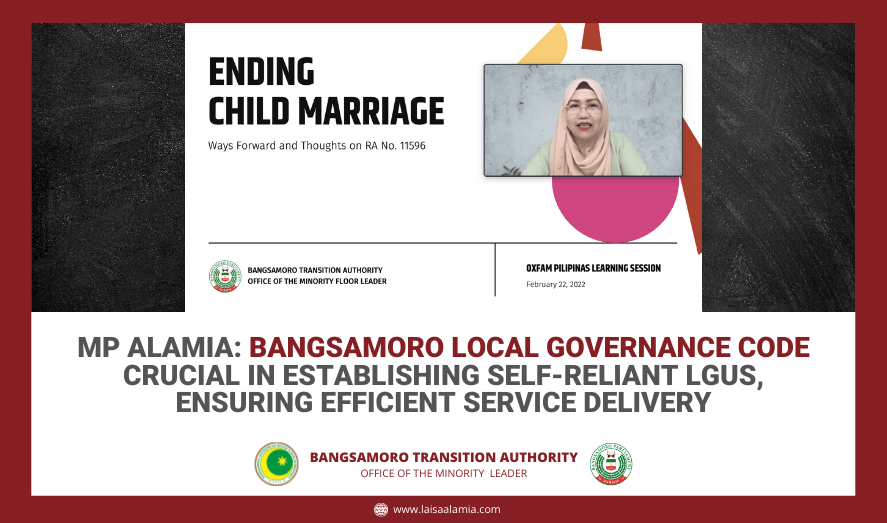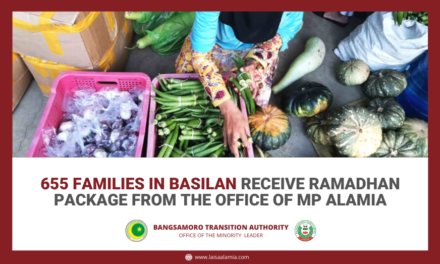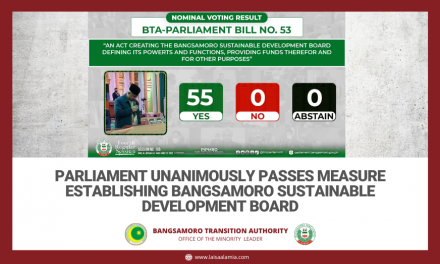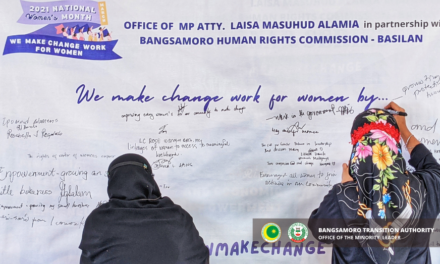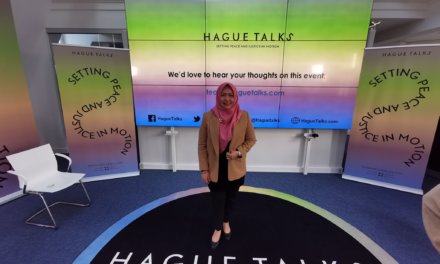In a learning session with advocates last Feb. 22, Minority Floor Leader MP Atty. Laisa Alamia shared her thoughts on Republic Act 11596 or An Act Prohibiting Child Marriage in the Philippines and Providing Penalties (RA 11596), with a comprehensive discussion of a situationer on child marriages in the Bangsamoro context.
The said event is part of “Creating Spaces to Take Action on Violence Against Women and Girls,” a continuing advocacy program led by Oxfam Pilipinas, which seeks to prevent violence against women and girls, and reduce cases of child, early and forced marriage (CEFM] in the provinces of Maguindanao and Lanao del Sur in the Bangsamoro Autonomous Region in Muslim Mindanao (BARMM).
MP Alamia has been a consistent advocate for ending child marriages not only in the Bangsamoro region and the Philippines, but also in solidarity with fellow women and children’s rights advocates across Asia.
BARMM context indicates need for legislation concerning child marriage
“More than one third of children in the BARMM belong to poor families,” MP Alamia said, citing 2018 poverty statistics in the region. “Almost one third of women belong to poor families, while 26% cannot even meet their basic food needs.”
It is in this context that MP Alamia grounded her discussion of child marriage, emphasizing the need for social support and services for women and children in the region. With 28% of the BARMM population aged 3 to 24 not enrolled in schools, child marriages also make it impossible for girl children to pursue an education.
“There are those who will say that a girl can go to school even after marriage and during pregnancy, but this hardly ever happens given the Bangsamomro context,” MP Alamia shared. “Imagine a pregnant 12 year old child in Grade 6 or 7, can she really go to school? On top of the shame pinned on her, on top of a difficult pregnancy, how can she continue studying?”
“If a girl marries early, it is more likely that she will stop attending school, and she will soon have to confront the other challenges that would inevitably follow,” MP Alamia stressed.
Following mandate, commitments have been made
Based on Sec. 12 and 14 of Art. IX in the Bangsamoro Organic Law, the regional government is mandated to “uphold and protect the fundamental rights of women, including the right to be protected from exploitation, abuse, or discrimination,” and to “respect, protect and promote the rights of children, especially orphans of tender age.”
With this, regional offices and agencies had already taken steps to address the issue of child marriages. In 2019, the Bangsamoro Transition Authority (BTA) Parliament has pledged its full support to the Bangsamoro Children’s Declaration by virtue of Resolution No. 48, and “that laws passed by the Bangsamoro Parliament and the programs of the Bangsamoro Government shall ensure that children’s rights are promoted, protected and fulfilled.”
The Bangsamoro Women’s Commission has also been tasked to craft the Gender and Development Code and lead the region’s campaign against child and forced marriage. The Ministry of Health also aims to decrease cases of child bearing at an early age by 11%, while the Ministry of Social Services and Development has a Child and Youth Welfare Program with a budget of 129.2 million for 2021 alone. The Bangsamoro Human Rights Commission also has programs for child rights protection, promotion and fulfillment.
Issue of child marriages in urgent of action
The Philippines ranks 12th globally in the absolute number of child marriages. In the Bangsamoro region alone, there are approximately 88,600 child brides.
MP Alamia mentioned that there are some who question the need for RA 11596 when there are already other laws such as the Code of Muslim Personal Laws (PD 1083). “But take note,” she said, “the Philippines is a signatory to all the conventions that pertain to rights of women and girls, the rights of children, and other United Nations protocols.”
“Comments from the UN Nations Committee on the Elimination of Discrimination Against Women (CEDAW) on the Philippine government’s reports always counts child marriages among the harmful practices that the state needs to take responsibility for,” she said, further highlighting why RA 199596 is necessary.
“Its key policies emphasize the need to abolish traditional and cultural practices and structures that perpetuate discrimination, abuse, and exploitation of children, and there are those who might question the use of the words ‘abuse’ and ‘exploitation’ in the law,” MP Alamia pointed out.
“Imagine a girl below 18 years old who cannot legally give her consent, who needs guidance and protection, and yet you will be married off? She’s still a child,” she said, “and this makes her vulnerable to abuse and exploitation.”
Time needed for better coordination, cooperation
Present in the learning session were Oxfam’s implementing partners, including Al Mujadilah Women’s Association (AMWA), United Youth of the Philippines-Women (UnYPhil-Women), the Philippine Legislators Committee on Population and Development (PLCPD), and the Philippine Business for Social Progress (PBSP). Together with Oxfam and other stakeholders, they consistently supported and lobbied for the passage of RA 11596.
As the law rallies government agencies at all levels to now implement the law, MP Alamia also acknowledged the need for a period of transition that will allow better coordination and cooperation between the national government and the Bansgamoro government. She also emphasized the need for “follow through on the discussion of PD 1083 and RA 11596” as the Bangsamoro leadership continues to discuss the important issue of child marriage.
“Take note that those who are advocating for an end to child marriage does not aim to destroy our religion,” MP Alamia said. “I’m also a Muslim. Our only purpose and intent is to make sure that our daughters, nieces, sisters, and granddaughters are protected.”
“We are doing this because we want to protect our children, while also protecting our religious and cultural diversity,” she said.

